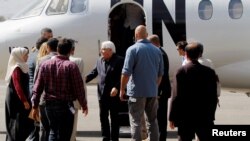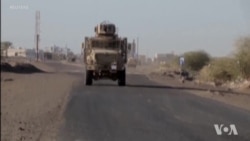U.N. envoy Martin Griffiths is in war-torn Yemen to prepare for peace talks after fresh fighting erupted in the key port of Hodeida.
Griffiths was scheduled to meet with Iran-aligned Houthi officials in the Yemeni capital of Sanaa in an attempt to persuade them and the Saudi-backed Yemeni government to begin negotiations in Sweden by year's end. The peace process collapsed in Switzerland in September when Houthi rebels failed to appear.
Both sides recently expressed support for Griffiths' efforts, but the eruption of violence after a lull raised the possibility talks could be derailed.
WATCH: Mattis: Yemen Peace Talks Likely in Early December
U.S. Defense Secretary Jim Mattis said Wednesday he expected the warring parties would hold peace talks in Sweden early next month.
Monday in New York, U.N. Security Council member Britain circulated a draft resolution to the rest of the council, calling for a cease-fire in Yemen, a halt to attacks on civilian areas, and unhindered access to Hodeida.
The port is under rebel control and is a lifeline for food, fuel, and humanitarian aid to the suffering population.
The Saudis have accused Iran of sending arms to the rebels through the port, a charge it denies.
The Trump administration has joined its Western allies in demanding a cease-fire in Yemen. The United States has stopped providing refueling services to Saudi coalition aircraft that attack Yemen.
The Houthis seized Sanaa in 2014, forcing the government to flee to exile in Saudi Arabia.
The group has since relocated to the southern Yemeni city of Aden.
Saudi-led airstrikes aimed at driving out the Houthis have killed thousands of people and wiped out entire civilian neighborhoods, including hospitals.
The fighting has compounded the misery in Yemen, which is also dealing with mass starvation and a cholera outbreak.
The war has created the world's largest humanitarian crisis.
The World Health Organization estimates nearly 10,000 people, mostly civilians, have been killed in Yemen since the Saudis intervened in March 2015. Some human rights groups, however, believe the death toll may be five times higher.
The International aid group Save the Children said in a report Wednesday about 85,000 children may have died of starvation and disease since March 2015.
The United Nations estimates more than 1.3 million children have suffered from severe malnutrition since the war began, it says up to 14 million Yemenis are at risk of starvation if the port is closed by violence or damage.







